Executive Summary
Education is a base stone for measuring the level of development and civilization of societies. In 2003the minister of education restricted governmental education to the UAE local students only. All non-local students started to move to private schools that are near their accommodations. From that time until now to lots of local and international schools started to expand out of the city of Abu Dhabilike Musaffah and Khalifa City, to serve the newly developing areas that have only a limited number of governmental schools. The suburb area of Abu Dhabi and in particularly Khalifa city A, B and C has numerous numbers of new projects and investments due to its strategic location.
In the Emirate of Abu Dhabi there are varieties of private schools for different stages. Khalifa city area is being developed and started to be occupied by locals and residents from high and middle-income class. Khalifa City occupants are suffering from lack of private schools and most families send their kids to AD in order to join good standards schools. Moreover, many locals are more interested to register their children in recognized private schools than in governmental system, seeking for high quality of education.
Recently some well known private schools initiated new schools out of the city of Abu and mainly in suburb area which lies 30 Km from Abu Dhabi like Khalifa City A, Musaffah and Mohammad Bin Zayed City to serve suburb students and at the meantime to expand and reduce operational cost, since such areas are less expensive than the downtown and still under development. We have noticed that Khalifa city B do not have private schools that can serve students of suburb area, therefore we decided to dedicate private school project from KG1 to grade five to take the advantage of first few movers and to provide mainly Khalifa city B locals and residents students with such essential requirement.
School overview
Khalifa Modern Private School is the first of its kind in Khalifa City B, since it is the second private school in that area. It will provide educational services for the primary stage from grade one to grade five in addition to the kindergarten stage that consists of KG1 and KG2. Khalifa Modern School follows an American curriculum. It will prioritize accepting students from Khalifa B residents first and then other areas that are close to it like Musaffa and Khalifa City A. Khalifa Modern Private School management will assign highly qualified teaching staff who has a minimum of five years of experience in the education field.
School’s vision
To be recognized as one of the best private schools locally and internationally.
School’s mission
Khalifa Modern School is an in-dependent, educational, profitable organization that will offer American curriculum. Our mission is to provide the best educational services and create innovative students. In our academic program, we will make every effort to provide a high-quality education that gives our students the ability to reach their full potential, both academically and personally. The school will assist students to become full and ethical contributors to the local and international society.
Objectives
- To provide unique and continuous educational services in the Emirate Abu Dhabi.
- To rise educational and academic level of students.
- To achieve reasonable profit that helps the school management to upgrade educational resourcesand school facilities on regular basis.
Keys to success:
- experienced managements and teaching staff (already in place)
- Obtaining recognition from the UAE Ministry of Education and then being recognized internationally.
Project description
About Khalifa City B
Location: it is on the main highway to Dubai and lies 30 kilometer from Abu Dhabi Khalifa City is the name used for the north area of Abu Dhabi. It is a suburb of city of Abu Dhabi. it is divided in to three areas: Khalifa City A , Khalifa City B, and New Khalifa Cit. all of Khalifa City area is being developed since 2002 in view of it will become the new city center of Abu Dhabi.Adjacent to Khalifa City B are a number of off island suburbs that are developing rapidly like Al Shawamekh, Bahia, and Raha Garden.
Khalifa City B has lots of new lunching projects that have been started from 2006 until now. It is developing rapidly since many local and international investors start to expand their business by moving from the city center to a new area like Khalifa A and B. Khalifa City B has residential apartments that are designed for middle to high income residents. Moreover, most of VIPs that are looking for luxurious life and quiet have new Villas in that area.
According to Falah Al Ahbabi, director of the Urban Planning Council (UPC), “In 20 years time, Abu Dhabi will have a new capital, built according to the vision of the President, His Highness Sheikh Khalifa bin Zayed Al Nahyan, and General Sheikh Mohammed bin Zayed Al Nahyan, Crown Prince of Abu Dhabi. Khalifa City area would be able to accommodate three million people in less than 25 years. The headquarters of all federal authorities, ministries and local government offices will be in Khalifa City. In addition, Khalifa City will house embassies and diplomatic delegations, in view of decreasing the pressure on the city of Abu Dhabi”
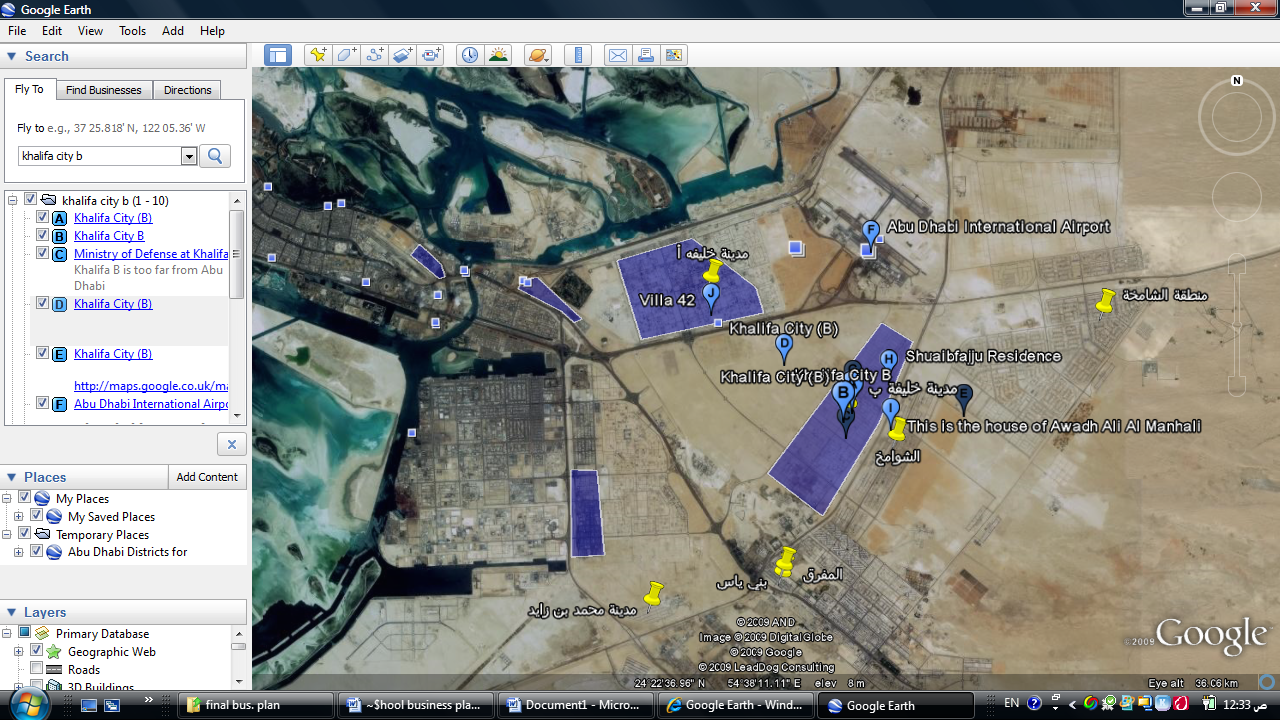
Core services description
Khalifa School will provide educational services from KG1 to grade five for both genders. it follows American systems only. It will be operating from Sunday to Thursday from 8: 00 am to 2:00 pm and from September until the end of June. Friday and Saturday are public holiday. Students’ pick-up and delivery service will be provided for Khalifa A and B students only. The school will be able to serve a capacity of 150 students during introduction stage.
The school building is made out of one rental villa in Khalifa city area that has at least minimum of 13 rooms with its facilities to fulfill two classrooms of KG 1and KG2, 5 classrooms for primary stage from grade 1 to 5, and three rooms for admin staff. There will be only one section for each grade. The class capacity is 25 students. Beside educational service the school has nutrition, healthcare and entertainment activities. Gymnasium is an essential part of the school building. Healthy breakfast meals and lunch boxes will be distributed it to all students. Moreover fulltime resident nurse is going to be assigned to follow up students’ health.
Process flow
The process of issuing a new private school request is as follows:
- The possible owner of the Khalifa Modern private school should contact Abu Dhabi Educational Council (ADEC) or simply the can go to their website to find the necessary information and the request form.
- The form is filled with all the necessary information and returned back to ADEC.
- ADEC audits and revises those requests and may also visit the location if already exist.
- An interview is scheduled with the school owners, comments or suggestions are reported if found.
- The owners should consider councils comments and take the necessary actions to apply those changes.
- ADEC makes the final decision.
- Contractual arrangement is made between the two parties and a temporary license is given to the school.
Accreditation and Permanent license
After the school is established, it has to show its constant commitment to the educational standards to guarantee its eligibility to renew its license and remain as an accredited school. The Abu Dhabi Education Council will carry out a further inspection visit during the first months of the new school’s operation, and may at this stage award the school a full license if the Director-General is satisfied that the new school meets the requirements of the Guidelines.
The process to be accredited is as follows:
- Paying inspectional visits to the school from ADEC.
- Creating and writing reports based on the unplanned visits from ADEC- as mentioned above.
- Delivering these reports to “Nongovernmental School committee” in ADEC.
- Providing recommendations from the committee to the school’s principal to implement them.
- Notifying the school the results of their requests, in case approved formal documents are issued.
The requirements and evidence of compliance relate to
The school will be visited by Abu Dhabi Education Council Inspectors on a regular and ongoing basis as part of the continual accreditation process. These visits will normally take place every two years. However, ADEC reserves the right to visit more frequently than this. Where there is cause for concern about one or more aspects of a school’s compliance with the standards, ADEC will make more frequent inspection visits
CITA Accreditation
Khalifa Modern Private School will seek the accreditation from CITA (The Commission on International and Trans-Regional Accreditation). CITA is an international educational accreditation agency. It is the most rapidly growing accrediting agency in the world. As a global leader in accreditation, CITA provides systems of accreditation around the world. CITA standards promote quality schools and continuous improvement to enhance student success. CITA provides standards for education systems and develops customized accreditation protocols. CITA accreditation engages CITA schools in the world’s largest network of accredited schools.
Comprised of the premier American educational accrediting agencies, CITA provides customized accreditation protocols and standards for schools that cross the USA regions and for national and international schools around the world. CITA awards the accreditation. Participating regional commissions manage the accreditation protocol.
Qualifications
To fulfill ADEC’s requirements for teacher’s category in a non-governmental schools committee, he/she must be in one of the following categories:
- Maintains Teaching qualification from a higher education institution (University degree) in the United Arab Emirates or Accredited by ADEC.
- Obtains qualifications that prove he/ she have graduated from a high Educational institution accredited by ADEC with a bachelor degree as a minimum requirement. It is also expected that teachers in this category has a degree in teaching or equivalent in the related subject(s) from a high educational institution in the United Arab Emirates or Accredited by ADEC within 3 year from the moment they teach in UAE.
Required Qualifications for Teachers
The vast majority of our teachers should carry a teaching certificate from a known and certified educational institute, academic degree or a comparable teaching qualification. In appointing teachers, preference is given to those who:
- Have had a minimum of five years of teaching experience.
- Have previously taught internationally.
- Are able to differentiate for the needs of all learners.
- Have a comfort and competence with technology in the classroom
As a part of ADEZ (Abu Dhabi Educational Zone) policies and requirement, a list of all the available qualified instructors and Administrative candidates are provided by them for any school to choose from. In case there is not sufficient number to choose from the school can look individually for the appropriate candidates and send their CV’s back to ADEZ to prepare an interview. The purpose is to ensure that the right people are staffed. In case approved, ADEZ will give the school a green light to employ them, if not, then the procedure is repeated again.
Many of the specific positions and job descriptions are government mandated. Khalifa Modern Private School will fully comply with all such mandates:
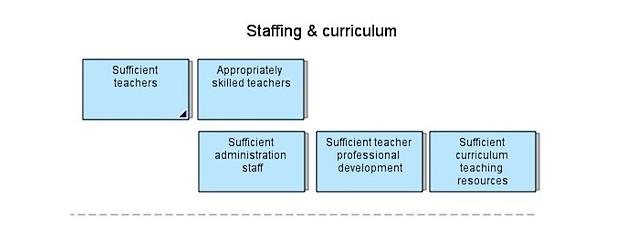
Curriculum
Khalifa Modern Private School offers an advanced level curriculum from kindergarten to grade 5 designed to prepare students for post-elementary studies. The language of instruction is English. The curriculum chosen and used based on four main goals:
- To teach the skills and concepts related to a traditional liberal education.
- To promote fluency in the use of written and spoken English.
- To meet the requirements of the Ministry of Education of the United Arab Emirates.
- To implant the values and attitudes held by the school administration and the cultural leaders in our community.
The curriculum spans two years of kindergarten, which are referred to as KG1 and KG2, 5 years of elementary schooling from grade 1 to grade 5. In each of these years, the curriculum combines core subjects – math, English, science, social studies, physical education Arabic and Islamic Studies; optional subjects – art, music, computers, and library; and required subjects –.
The curriculum and textbooks are mainly American and British in origin and influence, as are many of the teachers and their teaching methodologies. The approach is student-cantered, as opposed to teacher- or textbook-cantered, using an inquiry or investigative approach rather than uncritical reliance on traditional knowledge, and encourages discussion and research rather than rote learning and lectures.
There are some features of the curriculum that are unique to this school or to the United Arab Emirates. All Moslem students are given instruction in their faith, in Arabic.
Khalifa Modern Private School’s curriculum is committed to continuing the process of review, modernization, and improvement. The academic portion of the curriculum, however, is of little value unless it is supported by a sound moral and social framework. It would be irresponsible to provide students with the knowledge andskills necessary to succeed in the international scene without also giving them a set of values so that they can apply their knowledge wisely. Fundamental to the curriculum, then, is the fostering and application to life of some of the following precepts:
- To treat equally all people, regardless of race, color, language, nationality, religion, age or sex.
- To respect the environment.
- To demonstrate civic and national pride and responsibility.
- To respect law and order.
- To maintain decent standards of language and behavior.
- To have initiative and ambition.
- To respect elders and those in positions of authority.
- To have self-respect.
- To see hard work and personal effort as the keys to success
Advisors Network
To establish Khalifa Modern New School we have to cooperate and oblige by the rules and regulations of ADEZ (Abu Dhabi Educational zone) and ADEC (Abu Dhabi Education Council).
- ADEZ was established to work in integration with the Ministry of Education to hold the responsibility of education in the country. ADEZ has 138 schools with 66,090 male and female students. There are 61 girls’ schools with 31, 383 students and 61 boys’ schools with 30,895 students. Sixteen Kindergartens with 3812 kids, as well as several private schools and institutes that work are under ADEZ supervision.
- ADEC was established to assist ADEZ and the ministry of education to develop strategies and education in educational institutions in the Emirate of Abu Dhabi. It will provide technical assistance. They will also support relations between educational institutions and the private sector and many other things.
Pilot Approval
Khalifa Modern Private School is going to start first by renting a villa for approximately 5 years, a sufficient time to evaluate its position and makes the right decision whether it is beneficial to go for establishing a school or to remain in the villa. The villa has to contain all the requirements needed to open a school and must be approved by ADEC and complies with its policies.
The villa should have sufficient space – not less than 13 rooms- to dedicate at least 3 rooms for the Head master and his/ her assistant, teachers and Nurse Room. And another 3 rooms for lab, Music and Art classes, not to mention the play ground. Sports pitches must include playing field area or all-weather pitches to facilitate summer and winter games.
The school will be dedicated to instruct students from Kindergarten levels (KG1- KG2) and primary levels (From Grade 1-Grade 5) only as a first stage. The school will start the first year by opening one section for each level to accept at least 15 students in rooms that can fit up to 25 students.
Since Khalifa Modern Private School is going to implement the American System of teaching– Subjects are taught in English language except Arabic language and Religion- adapted to the cultural and environmental requirements set by the U.A.E. Ministry of Education.Religious training is provided for all Moslem students in our Islamic Studies courses. The Minimum number of Teachers to be employed is 6 teachers to teach from Grade 1 to Grade 5 and 4 teachers to teach Kindergarten level.
At the end of the third year , if the number of registered students increased as we expected, another villa will be rented to expand our educational service by adding extra section for each grade according to targeted customers’ demand.
Table 1: Specific Primary Rooms Areas Requirements
Other Requirements of Primary Teaching Areas
- Classrooms (enclosed rooms)or class-base (and opening onto shared teaching areas on one side): one for every class (usually to maximum of 30 pupils), providing table space and a chair for each pupil, facilities for a variety of curriculum activities and teaching resources
- Space for a cooker: at least a 4m2 food bay where a cooker can be situated for small groups, this could be off a classroom, as part of a shared teaching area or specialist practical space (see below).
- Science teaching areas (or laboratories) shall have sufficient and secure annexed storage space to enable its chemicals and equipment to be locked up.
- Generally any furniture over 2.1m in height counts towards the storage category.
Minimum Requirements for Washrooms, Toilets and Washbasins
Provision for Pupils
Table 2: Number of Toilets Required for Pupils
Table 3: Number of Washbasins Required for Pupils
Khalifa Modern Private School Organizational Chart

Financial analysis
Financial analysis is playing a great role in any business plan to give a real and accurate picture about the project, and it guides the expectations to the right track. It gives more realistic required rate of return and expected return.
In our analysis we tried to address and consider all kind of risks in our financial calculation. Furthermore, we tried to be even more conservative to avoid any uncertainty might happened during conducting the project.
In our financial analysis we rely mainly on two methods, first is the Net Present Value of the cash flow, second Internal Rate of Return and finally Discounted Pay back.
NPV
NPV = ![]()
Where:
NPV is net present value R is net cash flow at time t, i is discounted rate. It is expected to be 12% (WACC explained below).
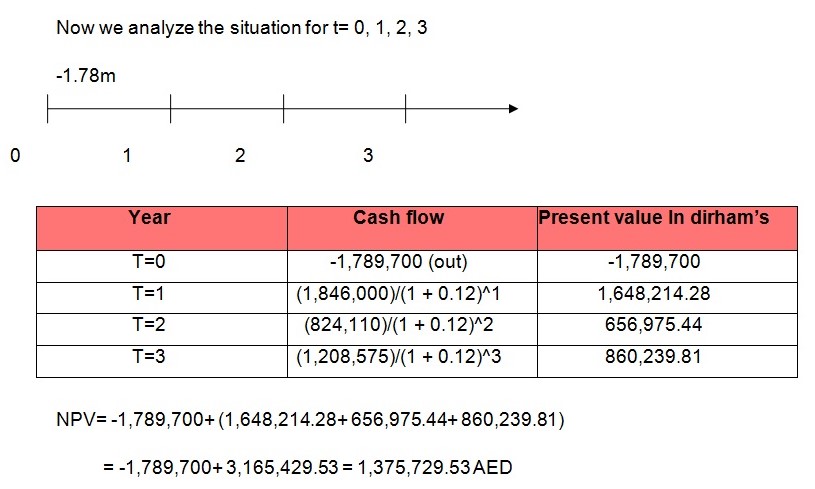
The Private School Investment should be accepted because it has a positive NPV.
The listed school project has a positive NPV like the proposed school.
IRR
IRR is called as internal rate of return. It can be calculated as the value of r when, NPV becomes zero.
Now for t=0, 1, 2, 3, we have NPV = -1,789,700 + (1,846,000)/ (1 + r) ^1 + (824,110)/ (1 + r) ^2 + (1,208,575)/ (1 + r) ^3 = 0
Now this gives r= 58.87999 %,This implies that internal rate of return is 58.87999%.
The listed company has IRR of 18.5% which is lower than our company:
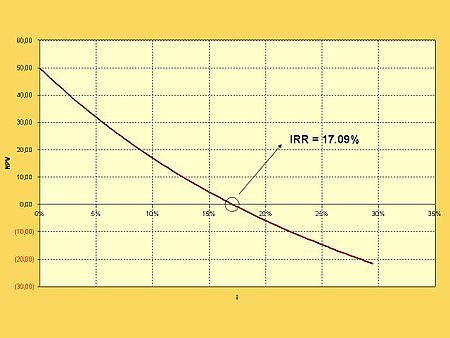
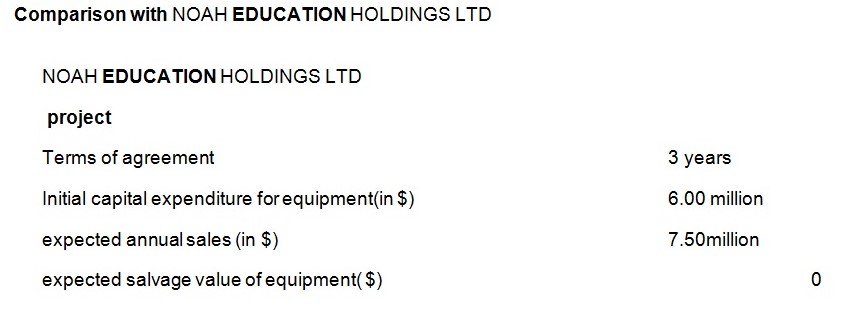
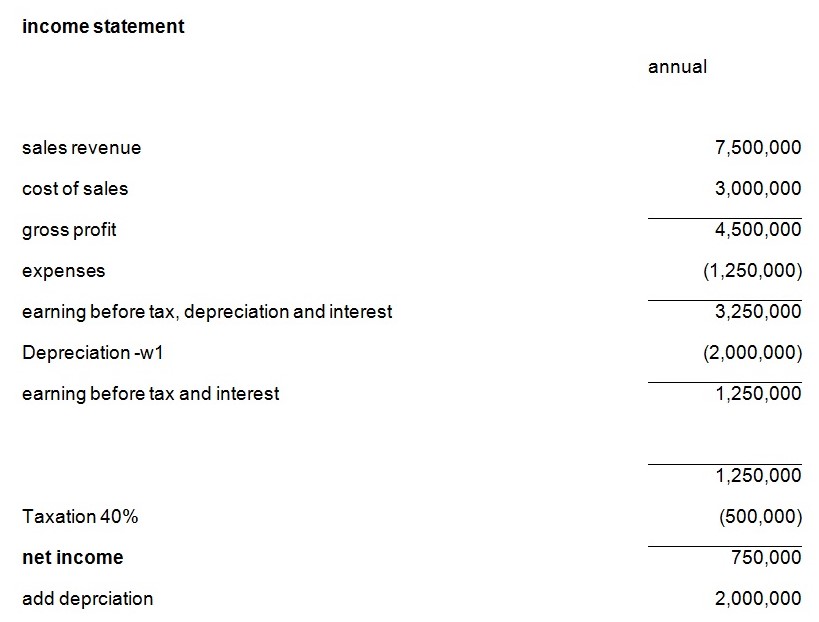

Pay Back Period
The payback period is the number of years required to recover the project amount. A project is accepted if the payback period is shorter than standard period set out by the company. in this case there is no standard given.
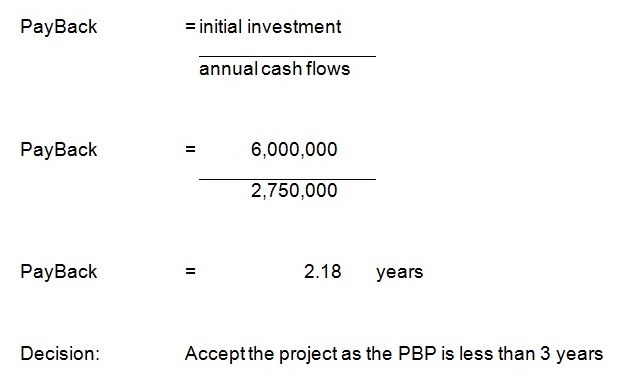
Net present value
The net present value considers Discounted cash flows. The criteria for acceptance of the project is accept project with a positive net present value and reject a project with a negative net present value. Weighted average cost of Capital will be used.
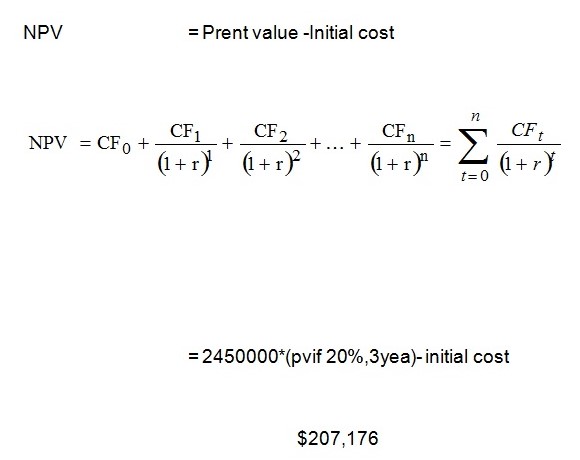
The net present value is $-207,176. The project should be accepted as it has a positive NPV.
Internal Rate of Return
In this case projects with IRR greater than WACC will be accepted. At IRR INITIAL COST = PRESENT VALUE OD CASHFLOWS. This is when the cashflows are uniform annually.
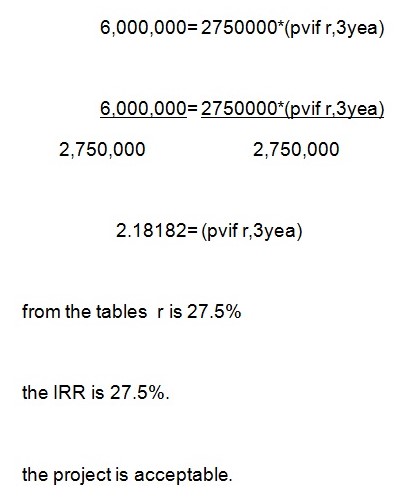
Discounted Pay Back period

Discounted Pay Back period IS more than the period of the project the project is acceptable.
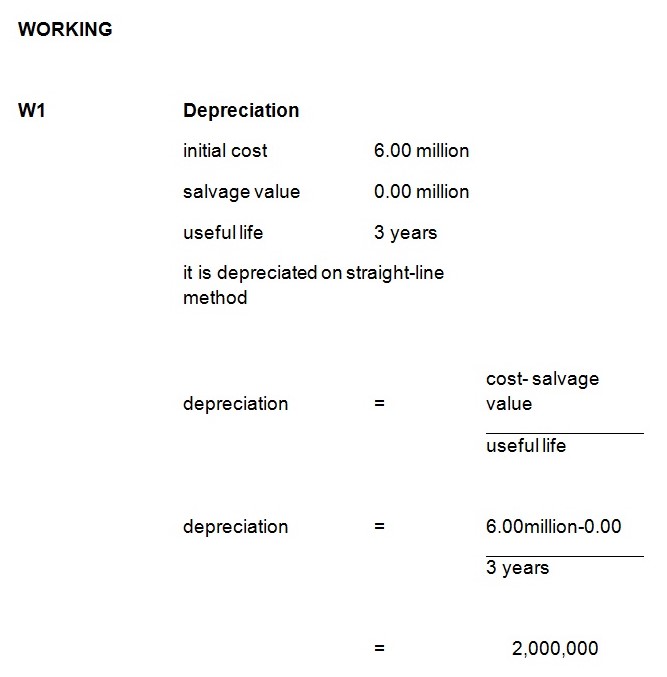
Discounted payback
Discounted payback is that period in which net cash inflows becomes net cash outflow considering the value of money. Now let us take rate of return to be 12%. Then time at which NPV becomes zero is discounted payback period.
From the NPV table we can notice that the discounted payback period for this project is 1.3 (one year and three months). In the case of a similar company listed in New York stock exchange it has 2.8 years as shown below:
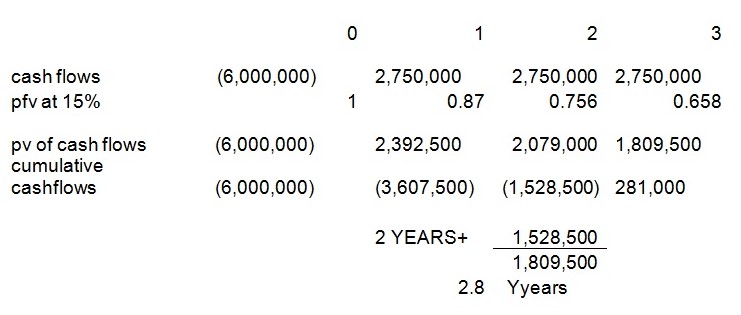
Capitalization Strategy (Funding needs & financing)
The initial fund which we need for our project is AED— million. We have 50% percent of this amount. The other 50%, can be get whether by loan through issuing bonds or issuing common stock by the 50% to a VIP investor like others. We can get this fund through two ways as the following:
Issuing Bond
We can issue bonds in the market to enhance our financial position (by loan). The disadvantages of this decision are:
- The interest must be paid on a periodic basis and the face value of the bond must be paid at maturity date. This condition might increase the difficulty in the future if we have to conduct the growth strategy.
- Debt to total asset ration (Total Debts/Total Asset): When we issue bond the percentage of total asset provided by creditor will increase and that reflect a high risk to meet the maturing obligation.
- Time interest Earned (IBTI/Interest expense): This ratio measure ability to meet interest payment as they come due. The risk of ability to pay the interest expense is very high when you issue bonds in the market.
Issuance Common Stock
We can get the rest of the money by issuing shares in the market:
- We can sell the 50% of the common stock to the VIP investor, considered as joint venture and actually this option has many advantages later on in the future plan.
- We issue 1,000,000 shares its book value 12 AED each, so the each one in the group will have 100,000 shares and the VIP investor will have 500,000 shares.
Financing
WACC analysis
The Weighted Average Cost of Capital is the required return on any investment by the firm that has essentially the same risk as existing operations.
WACC= (E/V) Re + (D/V) Rd (1-Tc)
Based on the below numbers the WACC formula is calculated No. of shares 1 million, book value 12 AED, stock currently sells for 10AED per share, the school Preferred stock is 50% of face value, it has face value 10million and it’s currently priced to yield 11%, the risk-free rate is 3.58% and the market risk premium is 7%. The estimated beta is 0.74 and the corporate tax rate is zero (in UAE).
- Cost of Equity = risk-free rate + beta* market risk premium = 3.58% + 0.74 * 7% =8.76% The total value of equity = 1 million * 10 AED= 10,000,000AED
- The cost of preferred stock is the current yield is 11%.
- WACC =.50* 11% +.50*8.76% = 9.88%
The Private school has an overall weighted average cost of capital of 9.88%.
The beta of 1.8932suggetss that the stock is more volatile than the market (market = 1.0). The current yield for the Risk free rate is 3.58%, market rate is 10%.
Rs = à + ß (Rm)
3.58%+1.893(10%-3.58%)
15.73%
The listed company has WACC OF 15% while the proposed school has 9.88%. This means the proposed company is better of the listed company.
References
www.adec.ac.ae
www.khalifaliving.com
www.doview.com
Miss Mona, (2009). General Assistant, Baniyas National private school. Telephone interview
Abu Dhabi Education Council (ADEC).Draft 2009.ADEC licensing and accreditation guidelines, UAE Abu Dhabi.
Lin, Grier C. I.; Nagalingam, Sev V. (2000). CIM justification and optimisation. London: Taylor & Francis. pp. 36.
Baker, Samuel L. (2000). “Perils of the Internal Rate of Return”.
Project Economics and Decision Analysis, Volume I: Deterministic Models, M.A.Main, Page 269